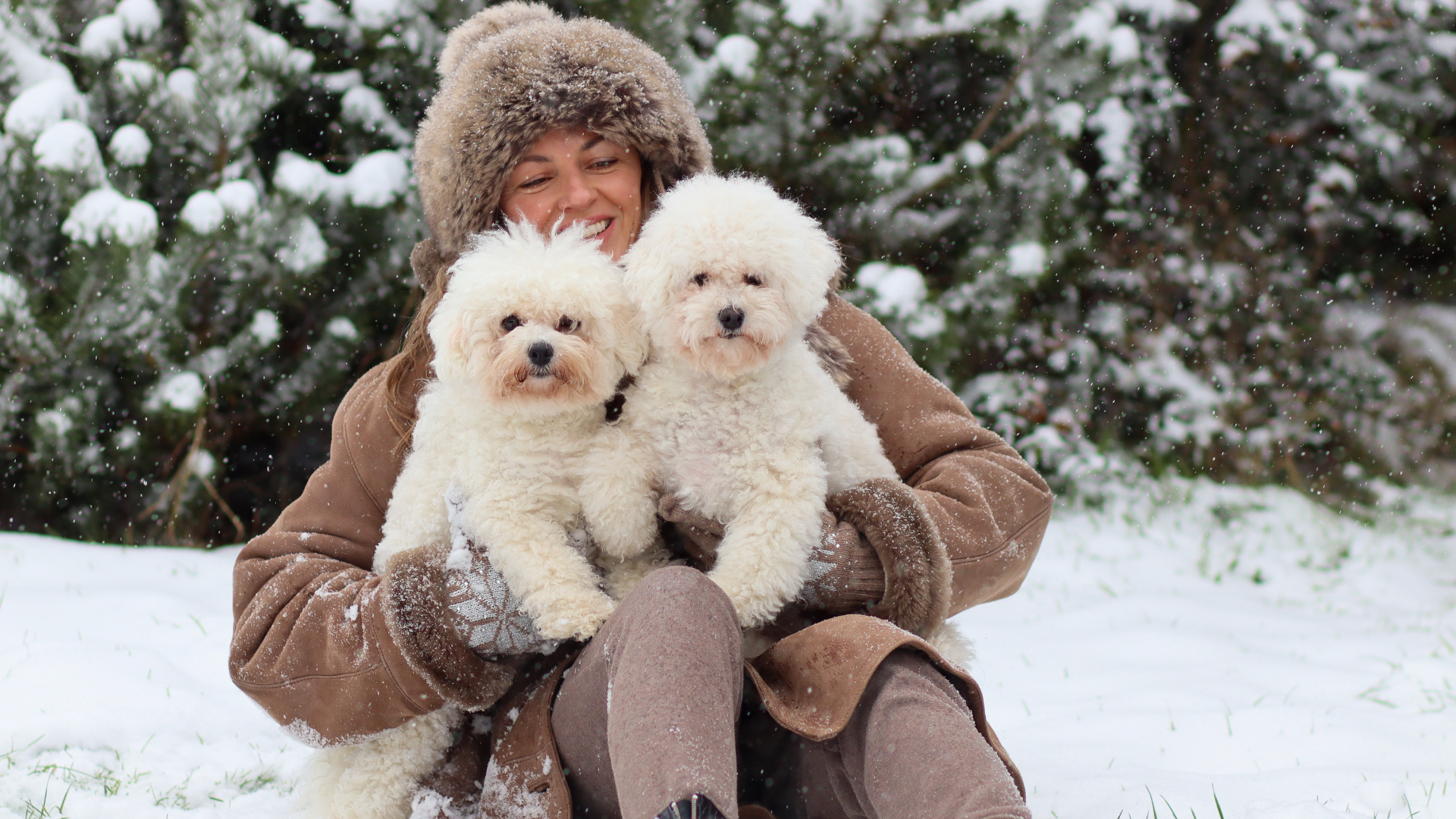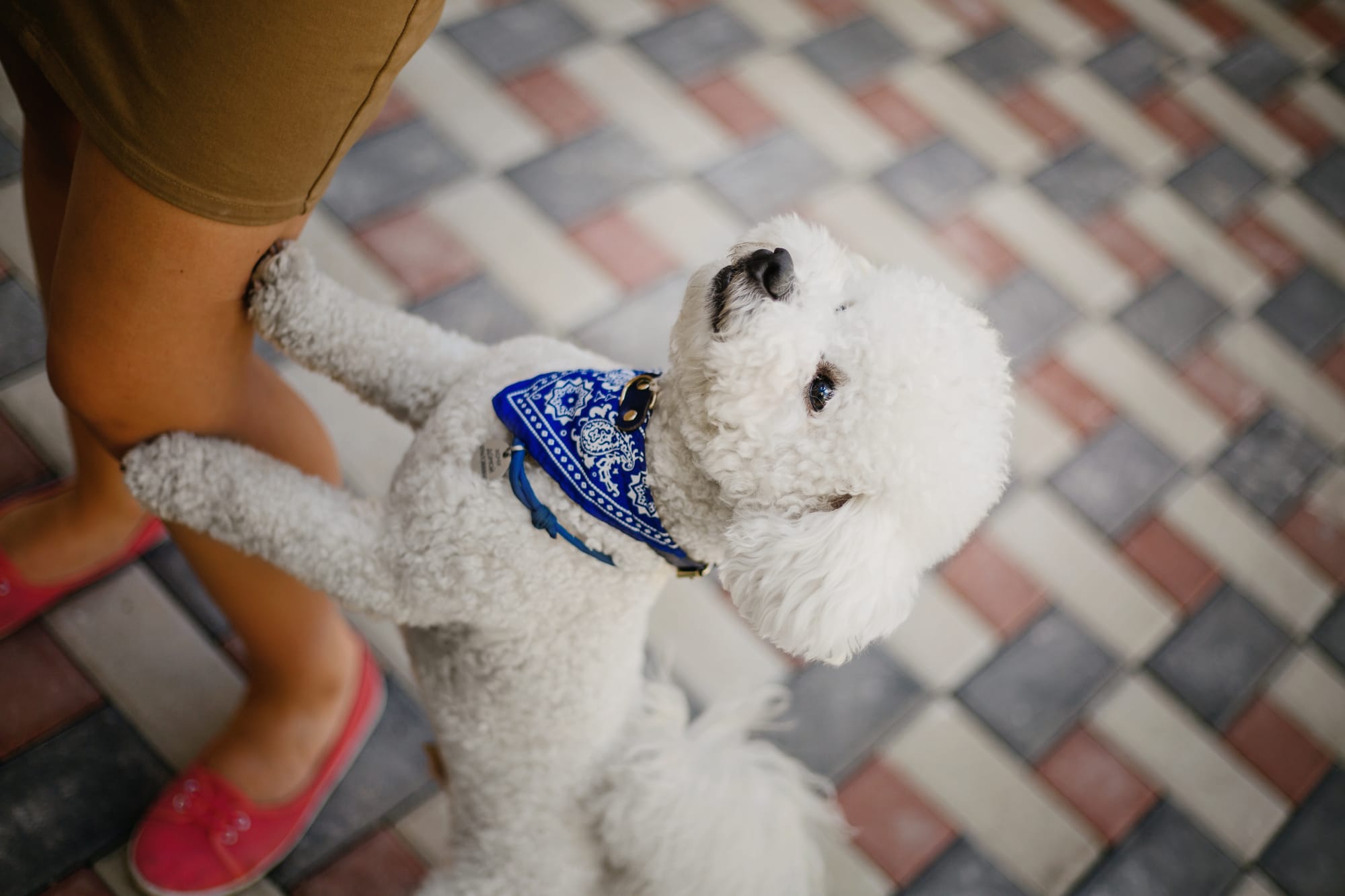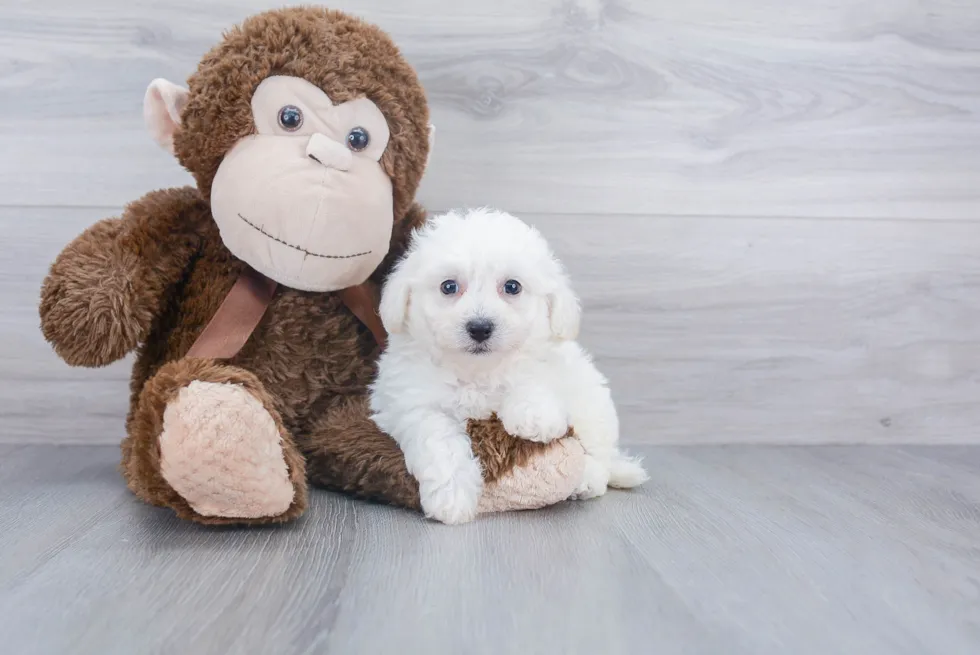Bichon Frises with their distinctive appearance and joyful disposition, have become popular pets for families worldwide. As prospective pet owners often seek companions that are not only adorable but also amiable, the question that often arises is, "Are Bichon Frise friendly?"

The answer is yes, Bichon Frises are generally very friendly dogs. They are known for their outgoing and sociable personalities, and they love to be around people. They are also very good with children, making them an excellent choice for families. However, like any breed, individual Bichon Frises may have different temperaments, so it's crucial to socialize them properly from a young age.
In addition to being friendly, Bichon Frises are also known for their intelligence and trainability. They are quick learners and respond well to positive reinforcement training methods. This makes them an excellent choice for families who want a dog that is easy to train and eager to please. Overall, Bichon Frises make wonderful family pets due to their friendly nature, intelligence, and trainability.
Breed Overview

History and Origin
The Bichon Frise is a small breed of dog that originated in the Mediterranean region. Its name comes from the French word "bichon" which means "small long-haired dog". The breed was developed from the Water Spaniel and the Barbet and was originally used as a lap dog for royalty and nobility.
The Bichon Frise was first brought to the United States in the 1950s and was recognized by the American Kennel Club in 1972. Since then, the breed has become increasingly popular due to its friendly and affectionate nature.
Physical Characteristics
The Bichon Frise is a small, curly-coated breed with a fluffy white coat. They typically weigh between 10-18 pounds and stand at around 9-12 inches tall at the shoulder. Their coat is hypoallergenic and requires regular grooming to prevent matting.
Despite their small size, Bichon Frises are known for their energetic and playful personalities. They are friendly and affectionate towards their owners and strangers alike, making them excellent family pets. They are also highly trainable and excel in obedience and agility competitions.
Overall, the Bichon Frise is a beloved breed that is known for its friendly and outgoing personality, as well as its distinctive curly coat.
Temperament and Personality
Bichon Frises are known for their friendly and cheerful temperament. They are affectionate and social dogs that love to be around people. Their happy-go-lucky personality makes them a popular choice for families with children.
Behavioral Traits
Bichon Frises are intelligent dogs that are eager to please their owners. They are known for their playful and curious nature, which can sometimes lead to mischief. However, with proper training and socialization, they can be well-behaved and obedient pets.
Compatibility with Children
Bichon Frises are generally good with children, but like any dog, they should always be supervised around young kids. They are small dogs that can be easily injured, so it's important to teach children how to handle them gently. With proper socialization, Bichon Frises can make great playmates for kids.
Socialization Needs
Bichon Frises are social dogs that thrive on human companionship. They can become anxious and destructive if left alone for long periods. It's critical to socialize them early on to prevent shyness or fearfulness. They also do well with other dogs and pets if introduced properly.
So, Bichon Frises are friendly and affectionate dogs that make great family pets. With proper training and socialization, they can be well-behaved and obedient companions.
Health and Care
Bichon Frises are generally healthy and robust dogs that can live up to 15 years with proper care. However, like any other breed, they are prone to certain health issues that owners should be aware of.
Common Health Issues
Bichon Frises are prone to allergies, which can cause skin irritation, itching, and ear infections. They can also develop dental problems, such as tartar buildup and gum disease if their teeth are not regularly brushed. Additionally, they can suffer from patellar luxation, a condition where the kneecap dislocates from its normal position, and cataracts, which can cause vision impairment.
Grooming Requirements
Bichon Frises have a thick, curly coat that requires regular grooming to prevent matting and tangling. They should be brushed at least once a week and trimmed every six to eight weeks to maintain their coat's shape. Regular grooming can also help prevent skin problems and keep the dog's coat healthy and shiny.
Exercise and Diet
Bichon Frises are small dogs that require moderate exercise to maintain their health and weight. They should be taken for a daily walk or allowed to play in a fenced yard. They also need a balanced diet that is appropriate for their size and activity level. Owners should avoid overfeeding their Bichon Frises, as they are prone to obesity.
Hence, Bichon Frises are friendly and healthy dogs that require regular grooming, exercise, and a balanced diet to stay healthy. Owners should also schedule regular veterinary check-ups to detect any health issues early and provide appropriate treatment.
Training and Intelligence

Bichon Frises are known to be intelligent and eager to please, making them relatively easy to train. However, like any breed, they require consistent and patient training to achieve success.
Learning and Obedience
Bichon Frises are quick learners and respond well to positive reinforcement training techniques. They have a strong desire to please their owners, which makes them highly trainable. However, they can be sensitive to harsh training methods and may shut down if they feel overwhelmed or intimidated.
It is important to start training your Bichon Frise early and to be consistent with your commands and expectations. They respond well to clear and concise commands and tend to excel in obedience training.
Housebreaking and Crate Training
Housebreaking a Bichon Frise can be challenging, as they have a small bladder and may need to go outside frequently. Crate training can be an effective way to help with housebreaking, as it provides them with a safe and comfortable space to rest and sleep.
When crate training, it is important to choose the right size crate and to make it a positive experience for your Bichon Frise. They should never be forced into the crate or left in there for extended periods.
Therefore, with consistent and positive training, Bichon Frises can be well-behaved and obedient pets. They thrive on human interaction and enjoy learning new tricks and commands.
Living with a Bichon Frise
Bichon Frises are known for their friendly and affectionate nature, making them great companions for families and individuals alike. They are adaptable to living spaces and can thrive in apartments as well as larger homes with yards.
Adaptability to Living Spaces
Bichon Frises are small dogs, typically weighing between 10-20 pounds, making them well-suited for apartment living. They are energetic and playful but also enjoy relaxing with their owners. While they do require daily exercise, they do not need a large yard to run around in. A short walk or playtime indoors can suffice.
Interaction with Other Pets
Bichon Frises are generally good with other pets, including cats and dogs. However, it is important to introduce them slowly and supervise their interactions to ensure they get along well. Bichon Frises are known for their playful and friendly nature, but they can become territorial if they feel threatened.
Separation Anxiety and Barking
Bichon Frises are known to experience separation anxiety if left alone for long periods. They may become destructive or bark excessively. It is important to gradually train them to be comfortable with being alone and provide them with plenty of toys and activities to keep them occupied.
In summary, Bichon Frises are adaptable, friendly, and good with other pets, making them great companions for those living in apartments or larger homes. However, they may experience separation anxiety if left alone for too long, so it is important to provide them with proper training and attention.
Choosing a Bichon Frise
If you are considering getting a dog, a Bichon Frise might be a good choice. This breed is known for being friendly, affectionate, and easy to train. However, before making a decision, it is vital to consider the pros and cons of the breed and to find a reputable breeder or rescue group.
Pros and Cons of the Breed
One of the main advantages of the Bichon Frise is its friendly nature. These dogs love people and are great companions, making them a good choice for families with children or first-time pet owners. They are also hypoallergenic, which means they are less likely to cause allergies in people who are sensitive to pet hair.
However, there are also some drawbacks to consider. Bichon Frises require a lot of grooming to keep their coat in good condition, which can be time-consuming and expensive. They are also prone to certain health issues, such as skin allergies and dental problems.
Finding a Reputable Breeder or Rescue Group
When looking for a Bichon Frise, it is important to find a reputable breeder or rescue group. A good breeder will be knowledgeable about the breed and will be able to provide you with information about the dog's lineage and health history. They will also be willing to answer any questions you have and will provide you with ongoing support.
If you decide to adopt a Bichon Frise from a rescue group, make sure to do your research and choose a group that has a good reputation. You should also be prepared to provide a loving and stable home for the dog, as many rescue dogs have had a difficult past.
Therefore, choosing a Bichon Frise can be a great decision for those looking for a friendly and affectionate companion. However, it is important to consider the pros and cons of the breed and to find a reputable breeder or rescue group to ensure a happy and healthy life for your new pet.
Special Considerations

Allergy Information
Bichon Frises are often referred to as hypoallergenic dogs, which means they produce fewer allergens than other breeds. However, it is important to note that no dog is completely hypoallergenic, and some people with severe allergies may still experience symptoms around Bichon Frises.
The Bichon Frise's curly coat does not shed much, which can help reduce the amount of dander and hair in the air. However, they still need regular grooming to keep their coat healthy and prevent matting. Allergy sufferers should consider spending time around a Bichon Frise before committing to adopting one to ensure they do not have an allergic reaction.
Behavioral Issues and Training Challenges
Bichon Frises are generally friendly and affectionate dogs, but they can have some behavioral issues and training challenges. They can be stubborn and may require consistent and patient training to learn new commands and behaviors.
Bichon Frises are also sensitive dogs and may become anxious or fearful if they are not socialized properly. They may also develop separation anxiety if left alone for long periods. Early socialization and training can help prevent these issues.
It is also important to note that Bichon Frises can be prone to allergies, including allergies to grass, pollen, and fleas. Regular vet check-ups and preventative measures can help manage these allergies and keep your Bichon Frise healthy.
Bichon Frise in Popular Culture
Bichon Frise is a breed of dog that has gained immense popularity over the years. With their charming personality and friendly nature, they have become a favorite among dog lovers all over the world. The breed has also made its way into popular culture, appearing in movies, TV shows, and even as celebrity pets.
In the United States, the Bichon Frise is a popular breed among pet owners. They are known for their affectionate nature and playful personality, making them a great choice for families with children. Their small size also makes them a good fit for apartment living.
In terms of charm, the Bichon Frise is hard to resist. Their fluffy white coat and adorable face make them one of the cutest dog breeds around. They are often used in advertising and marketing campaigns due to their charming appearance.
The breed's popularity in popular culture can be seen in movies such as "Best in Show," where a Bichon Frise named "Rhapsody in White" competes in a dog show. They have also appeared in TV shows such as "Full House" and "The Nanny."
Bichon Frises have also become popular as celebrity pets. Actress Jennifer Love Hewitt, singer Celine Dion, and former First Lady Barbara Bush are just a few of the celebrities who have owned Bichon Frises.
So, the Bichon Frise's friendly nature and charming appearance have made it a beloved breed in popular culture.
Conclusion

In conclusion, Bichon Frises are renowned for their friendliness and amiable nature. Their positive impact on the emotional and physical well-being of their owners makes them exceptional companions. Owning a Bichon Frise comes with the responsibility of providing love, care, and proper training. Encouraging responsible pet ownership ensures a harmonious relationship between Bichon Frises and their human companions.
Frequently Asked Questions (FAQs)
- Are Bichon Frise good with kids?
- Yes, Bichon Frises are generally good with kids. Their playful and gentle nature makes them great companions for children.
- How to train a Bichon Frise to be more friendly?
- Training a Bichon Frise to be more friendly involves positive reinforcement, early socialization, and consistent exposure to various environments.
- Do Bichon Frises get along with other pets?
- Yes, Bichon Frises are known to get along well with other pets. Their social nature extends to other animals in the household.
- Can a Bichon Frise become aggressive?
- While uncommon, some Bichon Frises may display aggression. Addressing the root causes and using positive reinforcement can help manage and overcome aggression.
- How much socialization does a Bichon Frise need?
- Bichon Frises benefits from regular and varied socialization from an early age. Exposing them to different people, places, and situations helps develop their friendly and adaptable nature.




